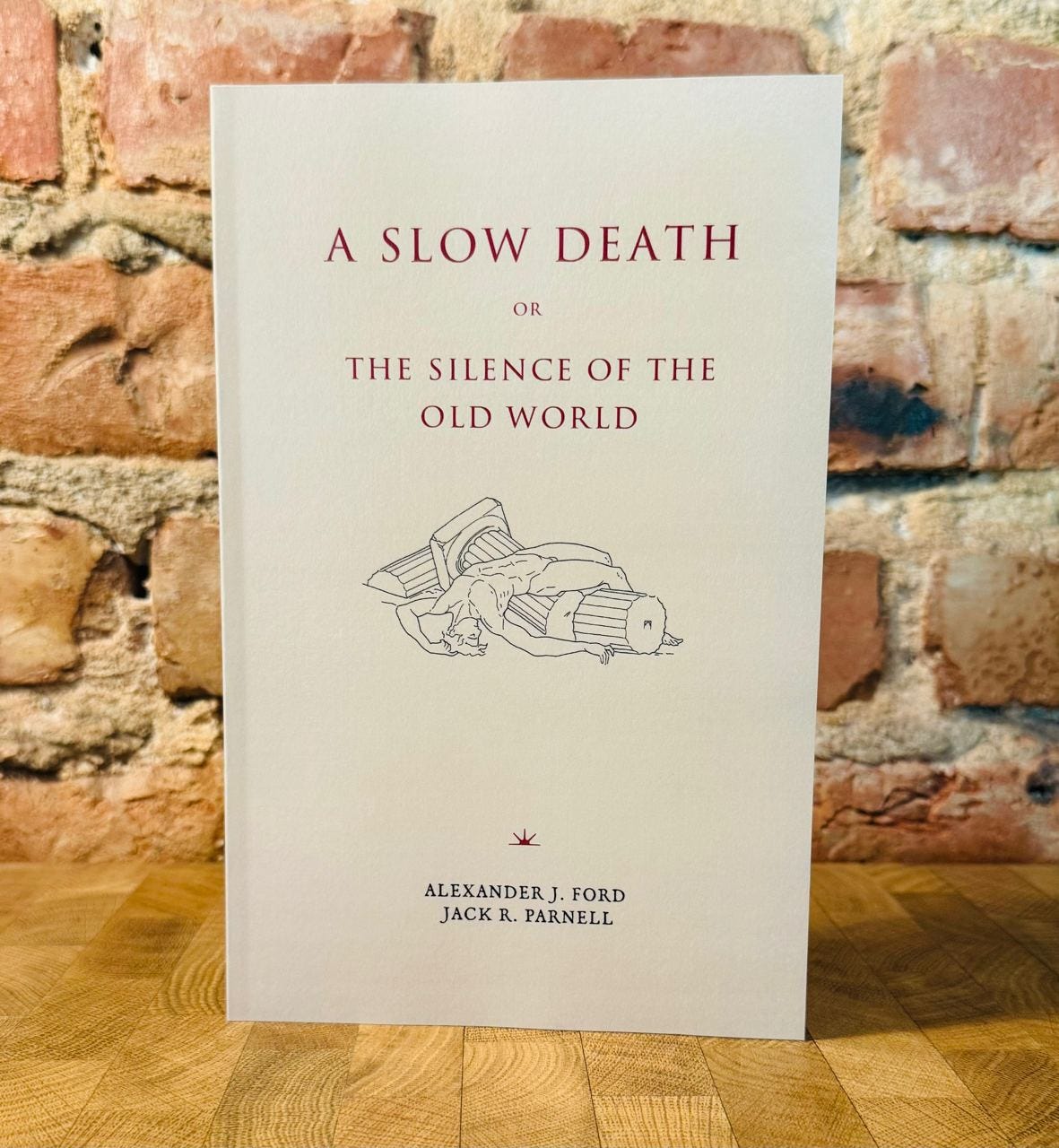Purposelessness
by Alexander J. Ford and Jack R. Parnell
Excerpt from A Slow Death or, The Silence of the Old World (PRAV Publishing, 2024).
The rational faculties of the mind operate by doubt; doubt is the process of the intellect. Through measurement, and by the accrual of data, doubt is allayed bit by bit. But there is a problem: Doubt, says Flusser, is itself subject to doubt. The intellect may doubt its own capacity, to apply Gödel; the rational acumen can fixate on itself and inquire after its own mechanism —that is, the doubt of doubt itself. The game of doubt, then, writes Wittgenstein, presupposes certainty. That is the simple, pessimistic seed of what we call nihilism; there can be no formulation of language which defines, categorically, what occurs at the precise moment that meaning is generated from meaninglessness. All that is meant by nihilism, then, is the fear felt over the non-countability of meaning.
What is meaning? If it must even be asked, one can only hope to torment the language into such a shape, as will be recalled by the initiate when, in the course of his own life, he chances to encounter the formless sensation of meaningfulness himself. It is what Cioran called “ecstasy in the life of the mystic;” it is the momentary ecstasy of symbolic accord.
Meaning is the name we give to the instance in which some shared quality appears before the considerate mind. When we employ the word, we intone the same idea that Aristotle intoned when he supplied the word sophia. Perhaps more poetically, if you’ll permit, we might say that meaning is understanding. In that moment, the symbolic word — if it was well placed — will suddenly rebound with new clarity and give form to the sensation of meaningfulness. Without the word of a master having already been supplied, the initiate will only be arrested by some inarticulate understanding instead. Paralysis; paroxysm. With no traditional framework, he would be imprisoned in that idiosyncratic moment for god-knows how long, struggling to articulate it. Many never escape, becoming on account of a paucity of temperance and cultural form stark- raving instead. The system of cultural forms is what we call the canon. Without that canon, every man is cursed to spend his entire life struggling just to become a man at all; to know himself. But with it, his reach is extended and his constitution improved. The strife for him is not to become a man, but to become something more.
The problem of nihilism can be put, then, in the most simplistic terms: There is, and can be, no strict construction of language that describes the process by which meaning is created from non-meaning. In their own times both the Neoplatonist Proclus, and Wittgenstein recognized the essential character of silence in this respect; even the impenetrable stylist Heidegger extended himself so far as to term it sigetic: “...every saying,” he writes,“already speaks from the truth of being and can never directly leap over itself to get back to being itself.”
Reduced to its purest, mathematical form — to logical symbolism — language can only be used to identify the ways in which meaningfulness (or truth, if you must) moves through and is maintained within correspondence, or is snuffed out of correspondence. Not, crucially, how meaningfulness enters into correspondence in the first place. The mathematical reduction of language can only proceed to identify logical or illogical structures by making initial assumptions about what is true or not.
Faced with this problem, the materialist is in trouble. His conclusion becomes some shade of the idea that meaningfulness does not exist, that it can be redefined in different terms, or even that it must be a trick, an illusion, a lie, a ‘construct,’ and so on and so forth. All manner of postmodern stupidity arises from this point. The dialectic becomes inevitable for the materialist; the ‘relativity of that which is not relative’ — only in these terms does the supposition stand, that any thesis will contain within itself an antithesis, provided, however, that language (what is articulable) is the sole arbiter of gnosis, that Sophia is only a figment of the tongue. This is the illusion: that instruction is no different from understanding.
A layman who is enchanted by the materialists’ conclusion becomes something quite strange. His custom is to feel as if he knows everything. He will be unable to relate to man of antiquity, whom he will view as misguided, superstitious, ignorant, and altogether beneath him. At worst, complete indifference, at best, a self-righteous pity is all he can conjure for bygone men, and for what he now perceives to be the ‘sins of the fathers.’
Conversely, the anti-materialist mentality is one which realizes that in failing to quantify the generation of meaningfulness, he has not proven that it doesn’t exist, but rather has witnessed the outer limit of his own rational intellection. This is a mystical experience in the most exact sense of the word, not in the superstitious sense; it is quite literal, quite evident, entirely sober, common among any who are capable of grasping it; this is a holy revelation inasmuch as man of pre-industry intended the word ‘holy’ to mean anything at all — despite what adolescent, modern man makes of these old words. The presence of philistines who abuse these terms doesn’t preclude their meaning, it only occludes it. It is not a horizon insofar as ‘more’ rationality or a greater intellect could penetrate, but instead, one who witnesses the limit only peers out onto the world of action, from inside the comfort of contemplation. Such a one will see clearly that he knows nothing, and he will find a profound relation to man of antiquity — the works of whom will appear to him suddenly new — as if he had never looked at them before.
Lacan, almost ironically, was able to identify the role which metaphor plays in meaning-generation, saying rather that metaphor is situated at the precise point where meaning is generated from non-meaning. One might take Lacan at a glance to mean that metaphor is responsible for it. However this is not the case. Lacan only points out that where that mystical transmutation occurs, there one will inevitably find an abuse of language, a poetic misapplication of the stuff, in order to approximate that which it is ill-disposed to encapsulate. Regardless of what Lacan made of this realization, good or bad, the observation is itself accurate.
The first blow to the nihilistic Gorgon is this: Language does not determine meaning, meaning determines language. With this, a chivalric door — the key to which has been lost for centuries — suddenly lies open, and the shadow stretching in before us is that of a neophyte.
Since Wittgenstein, philosophers concerned with navigating the problem of nihilism have allowed themselves to be consumed by the petty, theatrical task of reasserting meaningfulness into the human experience, quantified and calculated. Their great dream is to solve the episteme. The goal, however, cannot be so progressive. The insurmountability of the seventh statement in the Tractatus continues to indict attempts by positivistic tinkerers to replace metaphysics with linguistics. With it, Wittgenstein indicted even himself, and he saw it. That is why he abandoned the project to work as an architect with Engelmann, and it is why the nature of his philosophical work thereafter differs so acutely in attitude from the Tractatus. The indulgent character of the past century’s popular intellectuals reveals that these modernists and postmodernists are, when at last drawing their shoddy and over-terminologized conclusions, only fashioning crude facsimiles of initiatory rites which pale before the canon. They betray themselves. Alexander Dugin writes in the introduction to the late Dasha Dugina’s singular, posthumous volume:
Postmodern philosophy and object-oriented ontology are the domain of philosophical demonology, analogous to the medieval legends of sorcerers’ and heresiarchs’ black miracles, a kind of Hammer of Witches which tells of what should not be done or uttered under any circumstances, but which some are nevertheless saying and doing.
The incredible machine of reason delivers us to the edge of the grave because that is its function; to us it poses the question that lies beneath all other questions. There is no justification, no argumentation, no why-for. No debate. To crawl in or to turn away? One has simply to choose. Released from fateful mechanism, the dead pity the living. Invigorated by mortality, the living pity the dead. And so on, and so on.
* * *
READ MORE: A Slow Death or, The Silence of the Old World by Alexander J. Ford and Jack R. Parnell (PRAV Publishing, 2024).



